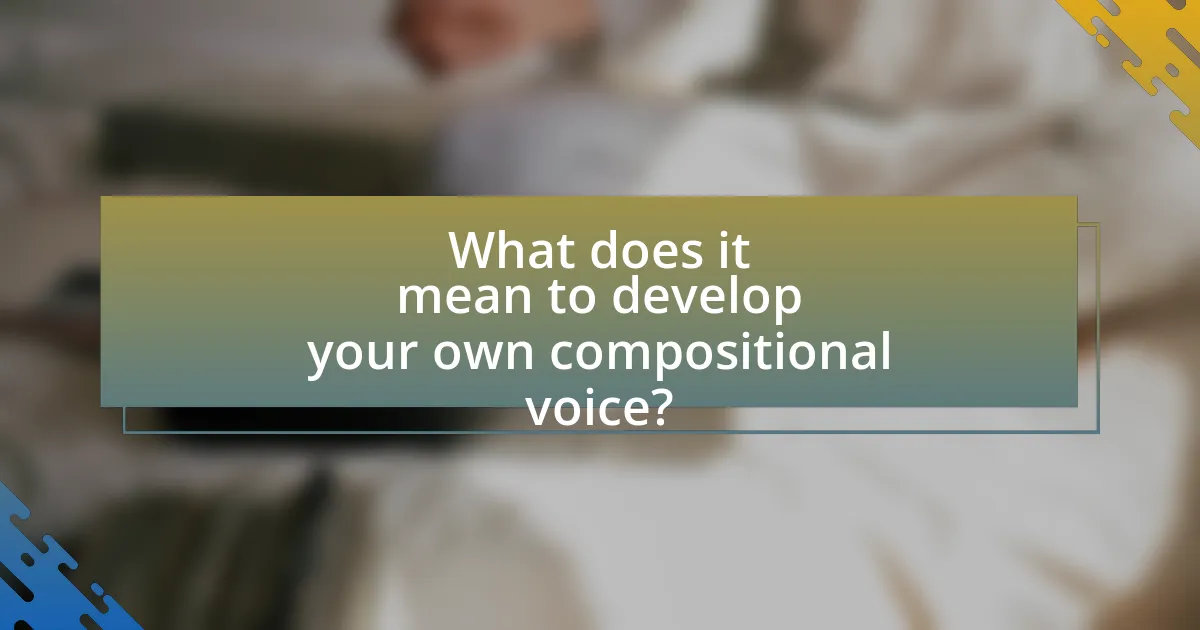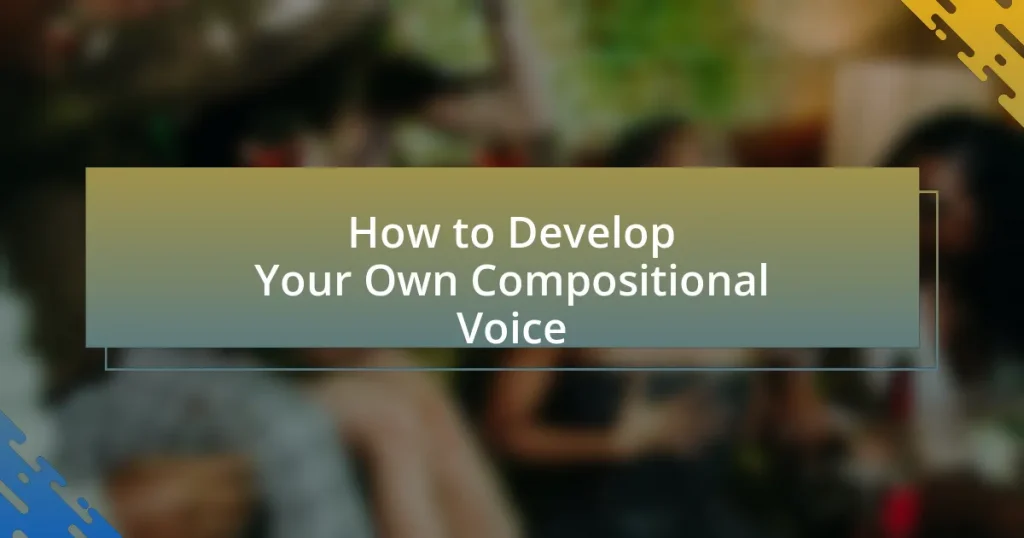Developing your own compositional voice is essential for creating a unique style and perspective in music or writing that reflects individual identity and artistic intent. This article explores the significance of a distinct compositional voice, highlighting its key elements such as originality, style, and thematic consistency. It discusses how personal experiences influence this voice and the importance of experimentation, collaboration, and feedback in the creative process. Additionally, practical strategies for refining and evolving one’s compositional voice over time are provided, emphasizing the role of consistent practice and goal-setting in achieving artistic growth.

What does it mean to develop your own compositional voice?
Developing your own compositional voice means creating a unique style and perspective in your music or writing that reflects your individual identity and artistic intent. This process involves experimenting with various techniques, genres, and influences to discover what resonates with you personally. For instance, many successful composers, like Igor Stravinsky and John Cage, are recognized for their distinctive voices that emerged from their willingness to explore and innovate within their craft. By honing your compositional voice, you establish a recognizable signature that sets your work apart in the artistic landscape.
How can understanding compositional voice enhance your music?
Understanding compositional voice enhances your music by allowing you to express your unique artistic identity and connect more deeply with your audience. A well-defined compositional voice helps in creating a recognizable style, which can lead to greater emotional impact and listener engagement. For instance, composers like Igor Stravinsky and John Cage are noted for their distinct voices, which not only set them apart but also influenced entire genres. By studying and developing your compositional voice, you can refine your musical choices, leading to more cohesive and compelling works.
What are the key elements that define a compositional voice?
The key elements that define a compositional voice include originality, style, and thematic consistency. Originality refers to the unique perspective and ideas that a composer brings to their work, distinguishing their music from others. Style encompasses the specific techniques, instrumentation, and musical language that characterize a composer’s output, often influenced by their cultural background and personal experiences. Thematic consistency involves the recurring motifs, ideas, or emotions that a composer explores throughout their pieces, creating a cohesive body of work. These elements collectively contribute to the identification and recognition of a composer’s distinct voice in the music landscape.
How does personal experience influence your compositional voice?
Personal experience significantly shapes compositional voice by infusing unique perspectives and emotional depth into the work. Composers draw from their life events, cultural background, and personal challenges, which inform their thematic choices and stylistic preferences. For instance, a composer who has experienced loss may express that emotion through somber melodies or harmonies, creating a distinct sound that resonates with listeners. This connection between personal narrative and musical expression is supported by research indicating that artists often reflect their lived experiences in their creative outputs, thereby enhancing authenticity and relatability in their compositions.
Why is it important to have a unique compositional voice?
Having a unique compositional voice is crucial because it distinguishes an artist’s work from others, fostering individual identity and recognition in a crowded field. This distinctiveness allows composers to express personal experiences and emotions, making their music relatable and impactful. Research indicates that artists with a recognizable style often achieve greater success and audience loyalty, as seen in the careers of composers like John Williams and Hans Zimmer, whose unique sounds have become synonymous with their names.
What advantages does a distinct voice provide in music composition?
A distinct voice in music composition offers the advantage of originality, allowing composers to create unique works that stand out in a crowded field. This originality can lead to greater recognition and a more personal connection with audiences, as listeners often resonate with the authenticity of a composer’s individual style. For instance, composers like Igor Stravinsky and John Cage are celebrated for their distinct voices, which not only defined their careers but also influenced entire genres and movements in music. Their unique approaches to rhythm, harmony, and structure have become benchmarks for innovation, demonstrating how a distinct voice can shape the landscape of music composition.
How can a unique voice impact audience engagement?
A unique voice significantly enhances audience engagement by fostering a deeper emotional connection and establishing authenticity. When creators express their individuality through distinct styles, tones, and perspectives, they resonate more with their audience, making the content more relatable and memorable. Research indicates that content with a unique voice can increase audience retention rates by up to 50%, as it captures attention and encourages interaction. This connection is crucial in a saturated market, where audiences are more likely to engage with content that feels personal and genuine.

What steps can you take to develop your own compositional voice?
To develop your own compositional voice, engage in consistent practice, study diverse musical styles, and reflect on your personal experiences. Consistent practice allows you to refine your skills and explore different techniques, while studying various genres exposes you to a range of compositional methods and ideas. Reflecting on personal experiences helps you infuse authenticity into your work, making it uniquely yours. Research indicates that musicians who actively engage with a variety of influences and maintain a regular practice schedule are more likely to cultivate a distinctive voice in their compositions.
How can studying different musical styles contribute to your voice?
Studying different musical styles can significantly enhance your vocal abilities by broadening your technique and expressive range. Exposure to various genres, such as classical, jazz, and pop, allows singers to adopt diverse vocal techniques, which can improve breath control, pitch accuracy, and stylistic interpretation. For instance, classical training emphasizes resonance and projection, while jazz encourages improvisation and emotional expression. Research indicates that singers who engage with multiple styles develop greater versatility, as evidenced by a study published in the Journal of Voice, which found that singers trained in diverse genres exhibited improved vocal agility and stylistic adaptability. This multifaceted approach ultimately contributes to a more unique and personal vocal identity.
What genres should you explore to find inspiration?
To find inspiration, you should explore genres such as jazz, classical, electronic, and world music. Jazz offers improvisational elements that can spark creativity, while classical music provides a foundation in structure and harmony. Electronic music introduces innovative sound design and production techniques, and world music exposes you to diverse rhythms and cultural influences. Each of these genres has a rich history and a variety of styles that can enhance your compositional voice by broadening your musical vocabulary and encouraging experimentation.
How can analyzing other composers’ works help you?
Analyzing other composers’ works can significantly enhance your own compositional skills by providing insights into various techniques, styles, and structures. By studying the harmonic progressions, melodic development, and orchestration choices of established composers, you can identify effective methods that resonate with audiences. For instance, examining the works of Bach reveals intricate counterpoint techniques that can be applied to your own compositions, while analyzing Beethoven’s use of thematic development can inspire innovative approaches to motif transformation. This practice not only broadens your understanding of musical language but also fosters creativity by allowing you to experiment with and adapt these techniques in your own unique way.
What role does experimentation play in developing your voice?
Experimentation is crucial in developing your voice as it allows for exploration and discovery of unique styles and techniques. By trying different approaches, such as varying instrumentation, structure, or genre, composers can identify what resonates with their personal expression. Research indicates that artists who engage in diverse experimentation often report a stronger sense of individuality in their work, as seen in studies by the Journal of Creative Behavior, which highlight the correlation between creative risk-taking and artistic identity formation. Thus, experimentation not only fosters innovation but also solidifies a composer’s distinct voice.
How can improvisation aid in discovering your unique sound?
Improvisation aids in discovering your unique sound by allowing musicians to explore spontaneous creativity and personal expression. Through improvisation, artists experiment with different melodies, rhythms, and harmonies, which can lead to the identification of distinctive musical elements that resonate with their individual style. Research indicates that improvisation fosters a deeper understanding of one’s musical preferences and capabilities, as it encourages risk-taking and innovation. For instance, studies show that musicians who engage in regular improvisation develop greater confidence in their artistic choices, ultimately contributing to a more authentic and recognizable sound.
What techniques can you use to experiment with composition?
To experiment with composition, one can utilize techniques such as varying structure, incorporating different genres, and manipulating rhythm. Varying structure involves altering traditional forms, like sonnets or symphonies, to create unique frameworks that challenge conventional expectations. Incorporating different genres allows composers to blend styles, such as mixing classical elements with jazz or electronic music, fostering innovation. Manipulating rhythm can involve changing time signatures or employing syncopation, which can lead to unexpected and engaging musical outcomes. These techniques have been widely adopted by composers to push the boundaries of their work and develop a distinctive compositional voice.

How can you refine and evolve your compositional voice over time?
To refine and evolve your compositional voice over time, consistently engage in self-reflection and experimentation with different styles and techniques. This process involves analyzing your previous works to identify strengths and areas for improvement, while also exploring diverse genres and influences to expand your creative palette. Research indicates that composers who actively seek feedback and collaborate with others can significantly enhance their artistic development, as collaboration fosters new ideas and perspectives. By integrating these practices, you can cultivate a unique and evolving compositional voice that resonates with your artistic identity.
What practices can help you continuously improve your voice?
Regular vocal exercises, such as scales and arpeggios, can significantly enhance your vocal abilities. These exercises strengthen the vocal cords, improve pitch accuracy, and increase vocal range. Additionally, practicing breath control techniques, like diaphragmatic breathing, supports sustained vocal performance and reduces strain. Engaging in consistent warm-ups before singing or speaking prepares the voice for use and minimizes the risk of injury. Furthermore, recording and analyzing your voice can provide insights into areas needing improvement, allowing for targeted practice. Research indicates that structured vocal training can lead to measurable improvements in vocal quality and performance, as evidenced by studies in vocal pedagogy.
How important is feedback from peers and mentors?
Feedback from peers and mentors is crucial for developing one’s compositional voice. This feedback provides diverse perspectives that can enhance creativity and refine skills. Research indicates that constructive criticism from experienced individuals leads to improved performance and greater confidence in one’s abilities. For instance, a study published in the Journal of Educational Psychology found that students who received regular feedback from peers and mentors showed a 30% increase in their writing proficiency compared to those who did not. This demonstrates that engaging with knowledgeable individuals fosters growth and helps individuals navigate their unique compositional journey effectively.
What methods can you use to self-evaluate your compositions?
To self-evaluate your compositions, you can use methods such as peer feedback, reflective journaling, and structured checklists. Peer feedback involves sharing your work with others to gain insights and constructive criticism, which can highlight areas for improvement. Reflective journaling allows you to document your thoughts and feelings about your compositions, helping you identify strengths and weaknesses over time. Structured checklists provide a systematic way to assess specific elements of your work, such as clarity, coherence, and originality, ensuring that you cover all critical aspects of composition. These methods are effective because they encourage critical thinking and provide diverse perspectives, ultimately enhancing your compositional voice.
How can collaboration influence your compositional voice?
Collaboration can significantly influence your compositional voice by introducing new perspectives and techniques that enhance creativity. When working with others, composers are exposed to diverse styles, ideas, and approaches, which can lead to the evolution of their own unique sound. For instance, a study by the University of California found that collaborative projects often result in innovative outcomes due to the blending of different artistic influences. This interaction not only broadens a composer’s musical vocabulary but also fosters an environment of experimentation, allowing for the exploration of unfamiliar genres and methods.
What benefits come from working with other musicians?
Collaborating with other musicians enhances creativity and broadens musical perspectives. When musicians work together, they exchange ideas, techniques, and styles, which can lead to innovative compositions that may not have emerged in isolation. Research indicates that collaboration fosters a sense of community and support, which can motivate individuals to push their creative boundaries. For example, a study published in the Journal of Music Theory found that collaborative songwriting often results in more diverse musical elements and richer harmonic structures, demonstrating the tangible benefits of shared musical experiences.
How can co-writing expand your creative horizons?
Co-writing can expand your creative horizons by introducing diverse perspectives and ideas that challenge your own thinking. Collaborating with others allows for the blending of different styles, techniques, and experiences, which can lead to innovative approaches and solutions in your work. Research indicates that collaborative writing can enhance creativity by fostering an environment where brainstorming and feedback are integral, ultimately resulting in richer, more varied content. For instance, a study published in the Journal of Creative Behavior found that co-writing significantly increased the originality of ideas generated compared to solo writing.
What are some common challenges in developing a compositional voice?
Common challenges in developing a compositional voice include finding originality, overcoming self-doubt, and mastering technical skills. Originality is often difficult as composers may unintentionally mimic established styles or genres, making it hard to create a unique sound. Self-doubt can hinder creativity, as composers may question the value of their work or fear criticism. Additionally, mastering technical skills, such as instrumentation and harmony, is essential for effective expression but can be a significant barrier for many. These challenges are frequently discussed in music education literature, highlighting the importance of perseverance and practice in overcoming them.
How can self-doubt affect your creative process?
Self-doubt can significantly hinder the creative process by causing individuals to second-guess their ideas and abilities. This internal conflict often leads to decreased motivation and productivity, as creators may avoid taking risks or exploring new concepts due to fear of failure. Research indicates that self-doubt can trigger anxiety, which further stifles creativity by limiting cognitive flexibility and the willingness to experiment. A study published in the Journal of Creative Behavior found that individuals with high levels of self-doubt reported lower levels of creative output and satisfaction in their work. Thus, self-doubt not only affects the quality of creative endeavors but also the overall enjoyment and fulfillment derived from the creative process.
What strategies can help overcome creative blocks?
To overcome creative blocks, individuals can employ strategies such as setting specific goals, changing the environment, and practicing free writing. Setting specific goals provides clear direction and reduces overwhelm, which can hinder creativity. Changing the environment can stimulate new ideas by providing fresh perspectives; for instance, working in a different location can inspire creativity. Practicing free writing allows for the uninhibited flow of thoughts, helping to bypass mental barriers and generate new ideas. Research indicates that engaging in diverse activities, such as physical exercise or mindfulness practices, can also enhance creative thinking by reducing stress and increasing cognitive flexibility.
What practical tips can you apply to develop your own compositional voice?
To develop your own compositional voice, consistently practice writing in various styles and genres. Engaging in diverse writing exercises allows you to explore different techniques and influences, which can help you identify what resonates with you. Additionally, studying the works of established composers and analyzing their unique styles can provide insights into how to cultivate your own voice. Research indicates that exposure to a wide range of artistic expressions enhances creativity and personal style development. For example, a study published in the Journal of Creative Behavior found that artists who experiment with different forms tend to develop a more distinct personal style over time.
How can setting specific goals enhance your compositional journey?
Setting specific goals enhances your compositional journey by providing clear direction and measurable milestones. When composers establish precise objectives, such as completing a piece by a certain date or mastering a specific technique, they create a structured framework that fosters focus and motivation. Research indicates that goal-setting can significantly improve performance; for instance, a study published in the “Journal of Applied Psychology” by Locke and Latham found that specific and challenging goals lead to higher performance levels compared to vague or easy goals. This structured approach not only helps in tracking progress but also encourages a sense of accomplishment as each goal is achieved, ultimately refining one’s unique compositional voice.
What daily practices can support your growth as a composer?
Daily practices that can support your growth as a composer include consistent writing, active listening, and studying various musical styles. Composing regularly, even for short periods, helps develop your unique voice and technical skills. Engaging with a wide range of music enhances your understanding of different genres and techniques, allowing you to incorporate diverse elements into your work. Additionally, analyzing scores and learning music theory can provide a solid foundation for your compositions. Research indicates that daily practice leads to improved creativity and skill development, as seen in studies on musicians’ practice habits published in the Journal of Research in Music Education.















